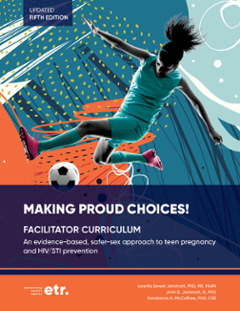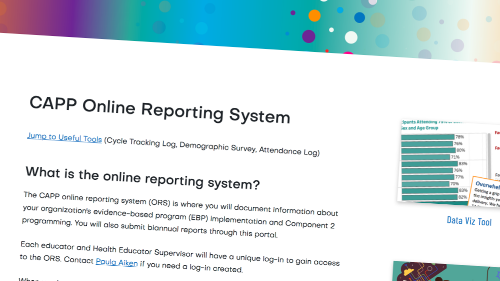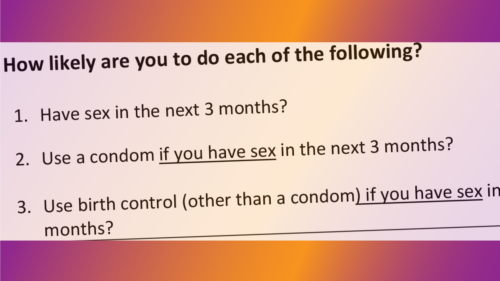CAPP: Making Proud Choices!
Making Proud Choices!: A Safer Sex Approach to Teen Pregnancy and HIV/STI Prevention (MPC) was developed to reach adolescents in a school or community-based environment. MPC is designed to help participants develop the knowledge, skills, and motivation necessary to change their behaviors in ways that will reduce their risk of contracting HIV and other sexually transmitted infections. To support youth in preventing unplanned pregnancies, Module 6 provides an overview of birth control methods. Three major themes support the curriculum: the community and family approach, the role of sexual responsibility and accountability, and the role of pride and making proud choices with safer sex as their choice.
Evidence of Effectiveness
In a rigorous research study published in 2022, participants in MPC reported less sexual activity six months after the program compared with the control group. The study was conducted in high schools; most participants were 9th or 10th grade students.

What edition should we use?
Providers funded by NYSDOH should use the edition that was updated by ETR in 2020-2021.

Curriculum Summary and Objectives
The curriculum's content is divided into eight 1-hour modules. It can be taught in a 2-day, 4-day, or 8-day format. Making Proud Choices! is designed to be used with high-school aged groups ranging from six to twelve participants but can be implemented for larger numbers if more time is built into each session.
At the end of this program students will have:
- Increased their knowledge about prevention of HIV, other STIs, and pregnancy
- More positive attitudes/beliefs about birth control and condom use and stronger intentions to use them
- Increased confidence in their ability to negotiate safer sex and to use condoms correctly
- Increased negotiation skills
- Improved condom use skills
- A lower incidence of HIV/STI risk-associated sexual behavior
- A stronger sense of pride and responsibility in making a difference in their lives
Implementing MPC
Making Proud Choices! is comprised of a series of fun and interactive learning experiences designed to increase participation and enhance learning while encouraging the practice of healthy behaviors. Activities include educational videos, brainstorming, role plays, small group discussions, and other exercises. Most activities are brief, lasting no more than 20 minutes.
Successful implementation of evidence-based programs requires significant planning. Use the template below to create your implementation plan.
Implementation guidelines make clear the program developer's recommendations as well adaptations you may need to consider. Take these guidelines into account as you plan for implementation.

Important Reminders
Pre-Post Surveys
Remember, pre-post surveys are required for each evidence-based program you implement. Learn more:
Educator Training
Prior to facilitating the program, educators must complete the Training of Educators for MPC and the online implementation training offered by ACT for Youth. Scheduled trainings are posted on the CAPP Training Calendar:
Documentation
All adaptations — planned and unplanned — must be recorded in the online reporting system.
Adaptations
While some adaptations will render a program ineffective (for example, turning a skill-building activity into a lecture), others are necessary (updating language to make a program more inclusive of specific populations, for example). Whenever possible, necessary adaptations should be planned in advance, working with ACT for Youth.
To help you plan, implement, and report adaptations systematically, ACT for Youth has developed planning tools for master lists of adaptations for each EBP. Health Educator Supervisors can use these tools to draft a master list. Below, we've provided a Be Proud! Be Responsible! (BPBR) master list as an example. Your ACT for Youth Support Team will work with you to finalize the list.
Additional Resources
Marketing MPC to Schools: Alignment with NYS Health Education Standards
Evidence-based programs can be aligned with New York State health education standards at many points. By learning the language of New York State schools and understanding how your program maps onto health education standards, you will be able to explain how your services can help schools meet their goals. The alignment grid below shows the points of connection between MPC and NYS health education standards.
Preparation: Supplies/Equipment Checklist
This checklist serves as a reminder of what educators need to bring on site to facilitate each module.
On Site: Adaptation Notes Tool
When adaptations happen on the fly, they must be recorded. All data on adaptations can help us understand how to improve program implementation. To facilitate note-taking, the document below has a notes section for each activity.
On Site: MPC Posters
Posters provided in the MPC program kit are small and hard to read. ACT for Youth has created color slides of each poster. These slides can be downloaded and enlarged.
Adaptation: Alternative Videos
ETR recommends these alternative videos as a green-light adaptation to ensure content is medically accurate, up to date, and inclusive.
Adaptation: PrEP and PEP
This document suggests adaptations to include information about PrEP and PEP HIV prevention medications.





